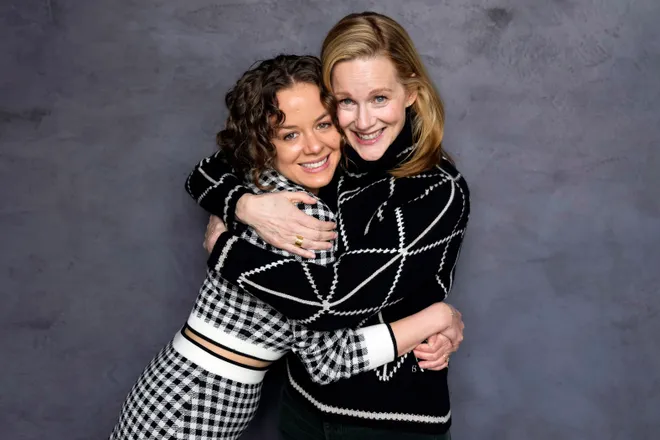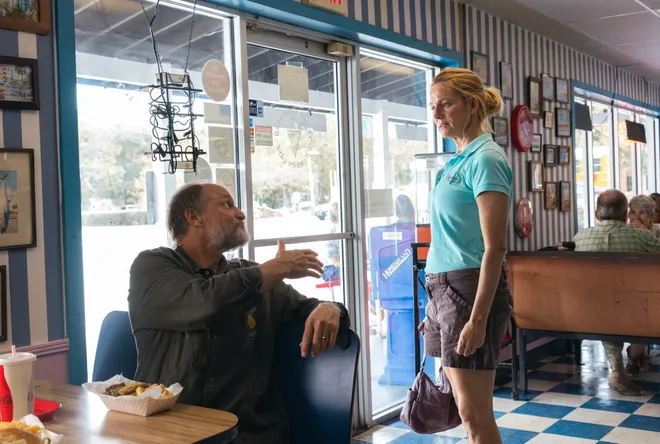'Queen of America' Laura Linney takes on challenging mom role with Sundance film 'Suncoast'

If Tom Hanks is America's Dad, Laura Linney is our mom.
That's the dream scenario for actor-turned-filmmaker Laura Chinn, who puts her childhood on screen in the new coming-of-age film "Suncoast." But for a while in the casting process, she wouldn’t allow herself to believe that Linney might actually say yes to playing her fictionalized mother.
“I was like, ‘But Laura Linney is the queen of America! How can I send her a script?’ And when she read it and wanted to meet, I spent the whole week dancing around my house,” says Chinn, whose film is playing now at Sundance Film Festival.
One Zoom call later, Linney was starring in Chinn’s semi-autobiographical, 2005-set dramedy as Kristine, an embattled Florida mom who moves her dying son into the same hospice-care facility as Terri Schiavo – the main nugget of truth from which Chinn fashioned the rest of her "Cinderella tale." ("Suncoast" streams on Hulu Feb. 9, but Sundance is including it in the festival's on-demand digital platform to watch Jan. 25-28.)
Kristine's life is so consumed with spending as much time with her son before the end comes that she winds up neglecting her quiet teenage daughter Doris (Nico Parker). And when Kristine wants them all to stay together at the hospice, Doris rebels and instead embraces her youth by having parties with classmates in her house with her mom away.
Ranked:All the best movies we saw at Sundance (including 'Suncoast' and 'Luther: Never Too Much')
Linney, who turns 60 next month, has played plenty of maternal characters in her long career – in addition to being, as Chinn points out, a familiar celebrity face who exudes warmth and inspiration. But for Linney, the challenge was the aspects of death and grief in Kristine's story.
“The future is not a bright thing for her and that's a very different dynamic to play with, just profound fear of the inevitability of what's coming," Linney says. "Letting go of a child, how do you handle that? How do you keep it all together?
“She can't fall apart. She can't. She's got to keep moving forward for (her son), and for all of them.”
One key scene occurs when a grief counselor at the facility asks Kristine if she has any children and she says one, her son. But she quickly remembers Doris and laughs nervously about her faux pas. “She's exposed herself to herself. There's a realization of truth that she was really not aware of,” Linney says. Adds Chinn: “That one misspeak says volumes about what's going on at home.”

Chinn remembers going to visit her brother at his hospice when she was 18, and getting searched for guns and bombs because of all the protesters. She couldn't even bring in a camera to take a picture of him. But her actual mother was never as “overtly flinty” as Kristine, Chinn says. "My mother was fiercely passionate about my brother. She gave up everything and just fought so hard for him. I wanted to capture that. And as a result, though, I was the other kid with that feeling of, well, I want attention, too."
Linney wanted to balance Kristine's “very fractious quality” with someone who is ultimately sympathetic and caring. “People are never one thing,” says the actress, who met Chinn’s mom and reports she’s “wildly different” from her character. “It's easier to make sense of the world if someone is just mean, just angry, just jealous, just wonderful, only generous. But we have to evolve our minds and our perception when you realize that everybody's carrying a whole lot within them.”
The three-time Oscar nominee has one son herself, Bennett, 10, and her own motherhood definitely affects how she plays roles like Kristine.
“It's the little stuff,” Linney says. “It's the way you look at your child. It's the way you smell them. It's how your face hurts when you smile for so long, because you love looking at them and you find them delightful. It's the frustration when they let you down. It's the sensory overload when someone is asking you question after question. It's feeling like you're not a good parent when you're doing your best. It's the gratitude of having them, and it's the fear of letting them go and feeling like you're letting them down and letting yourself down.
“It's all of those things you understand on a more cellular level.”
Linney doesn’t think she’s ever pulled from her own mom, at least not consciously, for her acting life. But, she says, “I do look like my mother more and more, and that's a bit of a freaker. Muscularly, the way my head will turn and it's like, ‘Oh, boy, that looks like my mother.’
“My mother is nothing like the characters that I've played," Linney adds. "She's a very different person. But I'm sure there are things that bleed through. That's sort of inevitable, but I've certainly not intentionally gone to that well.”
'Will & Harper':Will Ferrell's best friend came out as trans. He decided to make a movie about it.

Disclaimer: The copyright of this article belongs to the original author. Reposting this article is solely for the purpose of information dissemination and does not constitute any investment advice. If there is any infringement, please contact us immediately. We will make corrections or deletions as necessary. Thank you.







